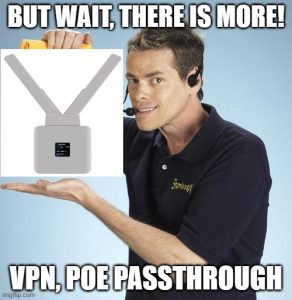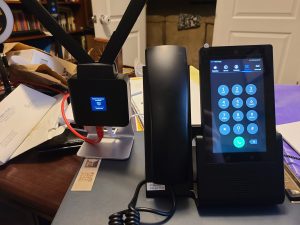UMR In-Depth Review
The Unifi Mobility Router is a very undersold, yet very useful, piece of equipment. If Ubiquiti negotiated a better deal from AT&T, it would be a game changing device.
I picked up a UMR on a whim because I’m a Unifi addict and I have to try something new.
Elmo gets it. Sometimes you just need the hit of opening a new Ubiquiti product.
Anyway, I wanted to use it when I taught Ubiquiti classes, as the ethernet ports in the hotels we teach at often don’t work or the guest network doesn’t like wired connections, so it’s hard to get a reliable WAN connection for the router the students are setting up. I quickly realized that some students would stream a ton of media “just because,” so after using up my data in one day, I decided that wasn’t going to work. I went to AT&T’s website, but I couldn’t find a useful unlimited data plan. After trying in vain, I put the UMR on a shelf, never to see the light of day.
Then my wife complained that the WiFi at our kid’s ballet studio was terrible. I gave her the UMR, plugged it into the USB port in our car, and voila! Her work laptop had a solid internet connection. She didn’t use a lot of data, so the UMR became hers for a few months with a 5 GB/month plan.
After a few updates and a few months later, I checked out the UMR interface and realized Ubiquiti had packed this little guy with a lot more capability. I also decided to shift my AT&T phones to a business plan instead of the residential plan…and that’s when I struck gold.
AT&T Business Plans will let you have a tablet SIM that has unlimited data. The cost varies depending on the kind of business plan you get. So I shifted all of my phones and three Ubiquiti devices (two UMRs and the LTE Backup Pro) to AT&T Business. The unlimited data tablet plan was ~$50/month and two 15GB/month plans each cost $20/month. Not bad, and definitely cheaper than the plans Ubiquiti offers with the devices. I also think the AT&T gal at the store wasn’t as familiar with promotions, so once I get my first bill I plan to call them to find a better fit.
I used WiFiMan to speed test my UMR. I can consistently get around 25-30 MBps down, which is good enough to stream some YouTube or conduct a Zoom call.
But there was more! 
I discovered you can setup WireGuard VPN. So I created a WireGuard VPN on my home UdM Pro router, then created a client and uploaded the file in the UMR. One click later and my UMR now automatically VPNs to home, allowing me to access my NAS while on the go. Even better, this means my wife can access the NAS through the mapped drives on her laptop, so she doesn’t have to do anything different. 
The connection is way more stable than the 5G on my phone when I’m driving in farm country. I’ve noticed a huge difference when I use my phone on a Zoom call and I’m out in the country. The connection is far more stable and I don’t drop calls like I did before.
PoE passthrough was another cool feature. I powered the UMR with a PoE+ adapter, then turned on PoE passthrough and hooked up a Ubiquiti Touch Phone that was set to Teleport home. Phone worked without any issue. This was really useful when I wanted to demonstrate how a Ubiquiti phone worked for a client.

Now, I didn’t like a few things. Ubiquiti charging for “Mobility Cloud” features is kinda lame, and if you don’t pay the $2/month, you lose the VPN access. The AT&T plans they have are garbage compared to what you get through AT&T business. The best thing Ubiquiti could do would be to negotiate a 5, 20 and unlimited data plan that includes “mobility cloud” and is on-par with AT&T business. If the unlimited was reasonably priced, this could easily replace the T-Mobile 5G routers that are popping up in the rural parts of America. Those routers suck, you can’t disable the onboard WiFi and they don’t get great signal in my experience.
The UMR doesn’t currently have Teleport, although WireGuard seems just fine for what I need.
There are cheaper devices that turn LTE into corded internet, but combined with the VPN and PoE Passthrough, the UMR is well worth the $200 investment. If Ubiquiti negotiated a better deal with AT&T, they would have a great travel/RV/rural router that would easily beat other competitors.
Author: Ryan Haag
